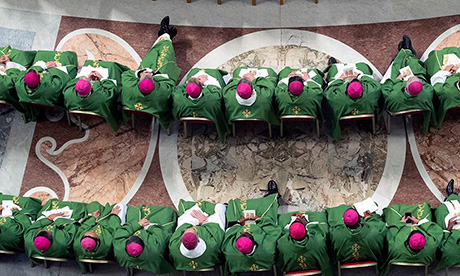In Pope Francis’ vision for the future of the Catholic Church, bishops will no longer make decisions alone but in dialogue and discernment with the faithful in their community.
The new, expanded two-year process to prepare for synods will begin in October and promises to flip the power structures in the church. When it comes to the voice of women in the church, though, it might not be enough.
The question of the role of women in church leadership remains one of the biggest ecclesial and social challenges in the Catholic Church.
Despite Pope Francis’ appointment of women in leadership positions at the Vatican, women are not allowed to vote in synods — the summit of bishops at the Vatican — and cannot be ordained.
“The problem is that nowadays most people still have the mindset of the church as the hierarchy. No! It’s not the reality of the church!” said Sr. Nathalie Becquart, who became the first female undersecretary of the Synod of Bishops when Pope Francis appointed her in 2021.
With the upcoming summit of bishops, “For a Synodal Church: Communion, Participation, and Mission,” which will begin on Oct. 10 and end when bishops convene in Rome in October 2023, the focus will be on disrupting that historical hierarchy and establishing a new system, “where all the baptized are part of the mission of the church,” Becquart said.
Synodality — or Francis’ vision for how to approach synods — is a touchstone to understanding his plans to reform the Catholic Church, but its meaning and application have been left open to interpretation.
“It’s not easy to explain what is synodality,” Becquart told Religion News Service in the Synod offices, a stone’s throw away from the Vatican, on Sept. 12. “You discover it through an experience.”
To that end, images are Becquart’s preferred medium to convey the meaning of synodality.
She pointed to several examples, from the biblical passage of the journey to Emmaus, where the resurrected Christ walked with two disciples, to the tent of the meeting in Exodus. Some, she said, have described synodality as “dancing together,” while “listening to the music of the Holy Spirit.”
The images attempt to convey a compelling decision-making model, where all Catholic faithful come together at the grassroots level to discuss, debate and dialogue on the direction of the church. What should emerge is a clearer understanding of the “sensus fidelium,” or “sense of the faithful,” an ephemeral concept meant to assign authority based on a universal consensus by believers.
The sensus fidelium, though, is still bound to the shepherding of the priests, bishops and even the pope, who are charged with keeping and preserving doctrine.
Decisions will be made differently, but this doesn’t mean “getting rid of the hierarchal principles,” Becquart said.
Will the talking ever end? As Western culture increasingly accepts women in positions of authority, the church does not seem to do so.
“Synodality is not a parliament” subjugated to majority and minority dynamics, she emphasized, but “through mutual listening we will find a consensus.”
Ultimately, though, an exclusively male clergy will have the responsibility of representing their lay people’s concerns and issues to the bishops’ conference and eventually to the Vatican.
Becquart, who might be the only woman eligible to vote at the synod of bishops, said she believes women will feel like they are part of the synodal church’s decision-making process through synodality.
But being part of the discussion may not be enough for a new generation of women who wish to have equal footing with men in the Catholic Church. With no promise of compelling male clergy to take into account the feelings of the faithful, especially women, synodality risks being nothing more than a well-intentioned conversation that can just as easily be dismissed.
“Will the talking ever end?” said Phyllis Zagano, a U.S. Catholic scholar who advocates for the promotion of women in the church, during a Sept. 10 webinar on synodality and women.
The effectiveness of synodality “will depend on the individual bishop,” she added, pointing to the disparate responses to the synodal process in several dioceses, especially in the U.S.
“As Western culture increasingly accepts women in positions of authority, the church does not seem to do so,” Zagano said.
Clericalism, the belief by clergy and faithful that those who are ordained have more authority, is “poised to derail the entire process if the voice of the people is not heard through official channels.”
Of course, unofficial channels for women’s voices to be heard have always existed in the church, through religious and lay movements and organizations, she added.
It’s “part of people’s DNA” today to expect women to be part of making decisions, said Ethna Regan, professor of theology and philosophy at Dublin City University, in an interview with RNS.
According to the theologian, the synod on synodality is an opportunity for the church “to really do something new in terms of consultation, and if they do not seize that moment, they have no faith in the Holy Spirit!”
“Either you believe the Holy Spirit is operative through the people of God and we can learn from each other, or you don’t. It’s as simple as that,” she said.
- Claire Giangravé is an author at Religion News Service.
News category: Analysis and Comment.




